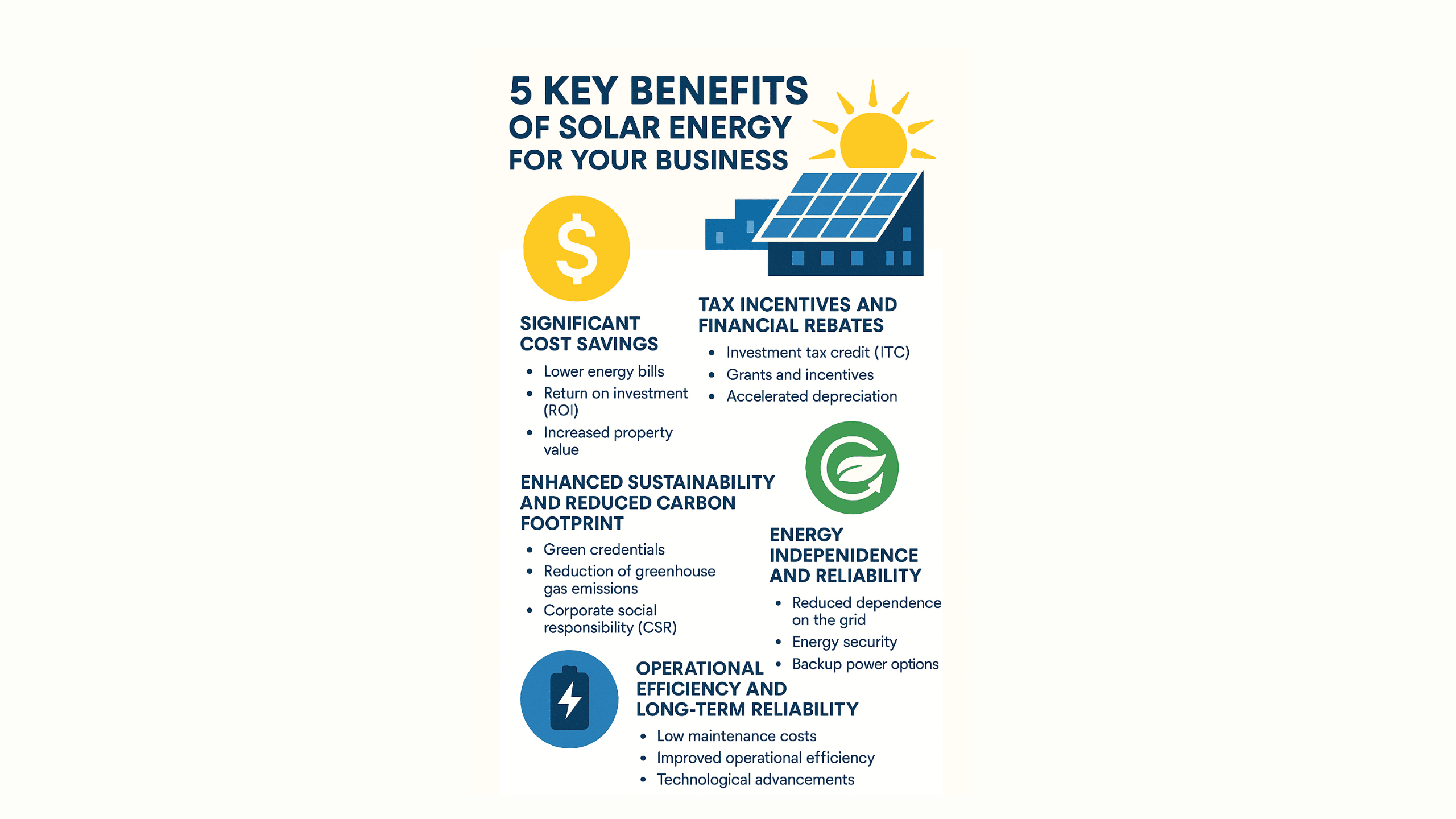In today’s rapidly evolving business landscape, companies are increasingly turning to sustainable energy solutions to enhance their operational efficiency, reduce costs, and align with modern environmental expectations. Among these solutions, solar energy stands out as one of the most impactful and beneficial options for businesses across the globe. By integrating solar energy systems, businesses can enjoy a wide range of advantages that not only contribute to the bottom line but also bolster their corporate responsibility efforts. Here are five key benefits of solar energy for your business.
1. Significant Cost Savings
One of the most compelling reasons for businesses to adopt solar energy is the potential for significant cost savings. The installation of solar panels allows businesses to generate their own electricity, which can drastically reduce reliance on expensive grid power.
Lower Energy Bills: With solar panels, your business can produce its own power, significantly reducing electricity costs, especially in areas where energy prices are high.
Return on Investment (ROI): After the initial installation, solar energy systems typically pay for themselves over time through savings on utility bills. In many cases, businesses see a return on investment within 5 to 7 years.
Increased Property Value: Properties with solar installations are often valued higher, providing long-term financial benefits should the business decide to sell or lease the property
2. Tax Incentives and Financial Rebates
Incentives play a major role in reducing the upfront costs of solar energy systems, making the transition to solar even more attractive for businesses. Governments around the world, both at the federal and state/provincial levels, offer a variety of financial incentives, rebates, and tax credits for businesses investing in solar energy.
Investment Tax Credit (ITC): In many countries, businesses can take advantage of tax credits that reduce the cost of solar installation by up to 30%, which significantly reduces the overall investment.
Grants and Incentives: Various regions offer grants or subsidies to help offset the cost of installing solar energy systems.
Accelerated Depreciation: Businesses can benefit from the ability to depreciate solar equipment over a short period, further reducing taxable income and providing immediate savings.
These financial incentives make solar energy even more cost-effective, allowing businesses to reduce their energy costs while receiving government support for their environmental initiatives.
3. Enhanced Sustainability and Reduced Carbon Footprint
As concerns over climate change continue to grow, businesses are under increasing pressure to reduce their environmental impact. Solar energy is one of the most effective ways to reduce a company’s carbon footprint and enhance its sustainability efforts.
Green Credentials: By adopting solar energy, businesses can reduce their reliance on fossil fuels, making their operations more eco-friendly and contributing to a cleaner environment. This can be a powerful selling point for environmentally-conscious customers and investors.
Reduction of Greenhouse Gas Emissions: Solar power generation does not emit harmful greenhouse gases, making it a key solution for reducing pollution. By switching to solar, your business can reduce its contribution to global warming and air pollution.
Corporate Social Responsibility (CSR): Businesses adopting solar energy align themselves with growing global efforts to tackle environmental issues. This can improve a company’s public image and strengthen its reputation among stakeholders, customers, and the wider community.
4. Energy Independence and Reliability
Solar energy systems offer a unique level of energy independence that traditional power sources simply cannot provide. Businesses are increasingly looking to minimize disruptions caused by power outages, energy price fluctuations, and geopolitical tensions that affect the global energy market.
Reduced Dependence on the Grid: By generating your own power, your business can become less reliant on external utility providers, which can lead to more predictable energy costs and a more resilient energy strategy.
Energy Security: Solar energy helps insulate your business from energy price fluctuations, ensuring greater financial stability in the long term.
Backup Power Options: Combining solar energy with energy storage solutions (like batteries) provides a backup power source, ensuring your business stays operational even during power outages.
This enhanced reliability and security can be a game-changer, especially for businesses in regions where power outages or energy supply disruptions are frequent.
5. Operational Efficiency and Long-Term Reliability
Solar energy systems are low-maintenance and designed to last for decades, which makes them an excellent long-term investment for businesses looking to boost operational efficiency and reduce the risk of energy-related disruptions.
Low Maintenance Costs: Once installed, solar panels require very little maintenance, which helps keep operational costs low. The majority of systems come with warranties that guarantee their performance for 20-25 years.
Improved Operational Efficiency: Having access to reliable, consistent energy means businesses can run their operations more efficiently without worrying about fluctuating energy costs or power interruptions. This is particularly crucial for industries where consistent energy supply is essential for production, such as manufacturing or food processing.
Technological Advancements: Solar technology continues to evolve, making systems more efficient and cost-effective over time. As these advancements become more widely available, businesses investing in solar today can benefit from the continued development of energy solutions.
Conclusion: The advantages of solar energy for businesses are clear and compelling. From cost savings and tax incentives to improved sustainability and energy independence, solar power offers a wide range of benefits that can enhance a company’s financial performance, operational efficiency, and reputation. As businesses continue to face pressures from both financial and environmental concerns, switching to solar energy presents an opportunity to take a leadership role in the clean energy transition while reaping long-term rewards.
Investing in solar energy is not just a smart financial decision; it’s also a forward-thinking approach to a more sustainable and resilient business future.
At Brightergy, we recognize the complexities and frustrations that come with managing energy costs and sustainability goals. We listen to your concerns and offer genuine support, backed by our extensive experience and expertise in renewable energy solutions.
With over 20 years in business, Brightergy has completed over a thousand commercial-scale solar projects across the Midwest. We’ve outlasted most solar warranties and exclusively focus on commercial installations using professional journeyman electricians.
Explore our energy solutions and speak to one of our energy advisors.

Commercial & Industrial
Manufacturers, distributors, retailers, and corporations cannot afford power or construction delays. Fast-paced cost-optimizing projects and comprehensive solutions are our specialty.

Non-Profits
Non-profit organizations are the life blood of our communities; we are thrilled to energize their missions and optimize their capital strategies using incentives and technologies to control operating expenses and grow their budgets.

Municipalities
Whether through a general solicitation RFP or direct source pricing, Brightergy helps state and local governments add efficient energy solutions to new and existing structures.

